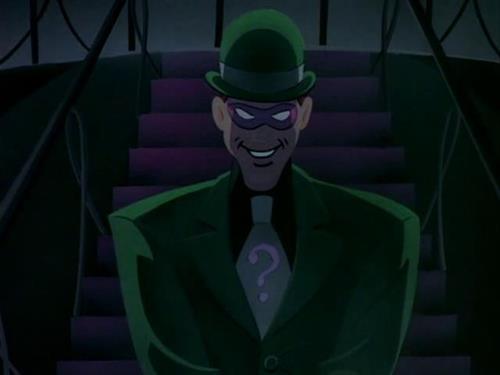Cultural and Thematic Significance
The Riddler, as portrayed in "Batman: The Animated Series," carries significant cultural and thematic weight, transcending his role as a mere antagonist. Edward Nygma, the man behind the Riddler persona, is emblematic of the complexities of intellect, ego, and the human desire for validation. His character's journey explores deeper themes of identity, justice, and the quest for meaning, aligning with broader human experiences and cultural narratives.
Thematically, the Riddler represents the duality between intelligence and morality. His obsession with riddles and puzzles reflects a mind that seeks not just to challenge others, but to assert dominance and prove superiority. This highlights the broader theme of the dangers of unchecked intellect and the moral void it can create when not coupled with empathy or ethical considerations. His constant need to outsmart Batman symbolizes the human struggle against self-imposed challenges and the need for self-worth.
The Riddler's storyline often delves into the theme of redemption. Despite his criminal actions, there's an underlying narrative of a man who might seek redemption but is trapped by his own compulsions and pride. This resonates with audiences as it mirrors the universal struggle for personal growth and the battle against one's own limitations and destructive habits. His inability to accept failure and the lengths he goes to prove his brilliance serve as a cautionary tale about the cost of hubris and the sacrifice of personal relationships for the sake of ego.
Culturally, the Riddler has become a symbol of the cerebral villain archetype, influencing numerous portrayals in media that explore the intellect as both a gift and a curse. Within the universe of Batman, he challenges the notion of justice, often forcing Batman to confront the limitations of his own methods and intellect. This dynamic underscores the theme of justice as not merely a battle of physical might but also of wits and moral fortitude.
In pop culture, the Riddler's impact extends beyond his role in the series. He has become an icon of the complexities of villainy, one that audiences can both revile and empathize with. His character serves as a reminder of the thin line between genius and madness, and the societal pressures that can lead one to define their worth through external validation and intellectual conquest.
Ultimately, the Riddler's significance lies in his embodiment of the eternal human quest for identity and recognition, and the moral dilemmas that accompany it. His story resonates as it invites viewers to reflect on their own lives, the importance of balancing intellect with empathy, and the pursuit of justice that goes beyond mere victory over adversaries.